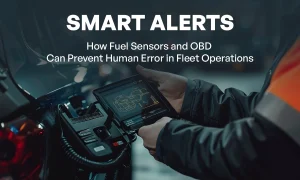The core functionality of OBD-II in vehicle health tracking lies in its ability to identify and diagnose issues through Diagnostic Trouble Codes (DTCs). These codes are standardized error messages that indicate specific problems detected by the OBD-II system. When a fault is detected, the OBD-II system records a DTC and illuminates the check engine light on the vehicle’s dashboard, alerting the driver to seek further diagnosis and repair.
This diagnostic capability is crucial for iot predictive maintenance, allowing for timely interventions based on data-driven insights. By analyzing DTCs and other OBD-II data, maintenance professionals can identify potential issues before they escalate into major repairs, enhancing the reliability and longevity of the vehicle.
In Fleet Health Monitoring, OBD-II systems offer invaluable benefits. Fleet managers can leverage OBD-II data to oversee the health and performance of multiple vehicles, identifying trends and addressing issues proactively. This data-driven approach ensures that each vehicle in the fleet operates at optimal efficiency, reducing downtime and maintenance costs over time.
The OBD-II system’s ability to monitor, diagnose, and provide actionable insights contributes significantly to the overall health and performance of individual vehicles and entire fleets, making it an indispensable tool in modern vehicle maintenance and management.
The introduction of OBD-II systems has revolutionized Vehicle Health Monitoring, playing a critical role in extending the service life of vehicles through advanced diagnostic capabilities and preventive maintenance strategies. By offering detailed insights into a vehicle’s operational status, OBD-II systems enable vehicle owners and fleet managers to adopt a proactive approach to maintenance, ultimately enhancing vehicle longevity and reliability.
Preventive maintenance is pivotal in avoiding unexpected breakdowns and costly repairs, and OBD-II systems are at the forefront of this maintenance strategy. By continuously monitoring and evaluating the performance of various vehicle components, OBD-II provides real-time data crucial for Vehicle Health Monitoring. This data enables car owners and technicians to address potential issues before they become serious problems, significantly reducing the likelihood of major failures and extending vehicle life.
The role of OBD-II in iot predictive maintenance is particularly noteworthy. With the integration of IoT technology, OBD-II data can be analyzed in real-time, allowing for predictive maintenance models that can forecast potential issues based on current data trends. This approach to Vehicle Health Monitoring ensures that maintenance can be scheduled at the most opportune times, minimizing wear and tear and extending the vehicle’s operational lifespan.
OBD-II systems excel in identifying and diagnosing minor issues before they escalate into significant problems. By interpreting the Diagnostic Trouble Codes (DTCs) generated by the OBD-II system, technicians can pinpoint specific issues and address them promptly. This capability is a cornerstone of effective Vehicle Health Monitoring, as it allows for targeted interventions that prevent minor issues from developing into more severe complications.
Moreover, the role of OBD-II in Vehicle health tracking extends beyond mere fault detection. It provides a comprehensive overview of a vehicle’s performance metrics, enabling a deeper understanding of its overall health. This detailed monitoring facilitates a nuanced approach to maintenance, where decisions are based on data-driven insights, enhancing the effectiveness of preventive measures and further contributing to vehicle longevity.
For fleet managers, OBD-II systems offer substantial benefits in maintaining the health and efficiency of multiple vehicles. Fleet Health Monitoring via OBD-II allows managers to track the performance and condition of each vehicle in real-time, ensuring that all units are operating optimally and any issues are addressed promptly.
In iot predictive maintenance, OBD-II data becomes even more valuable for fleets. By leveraging IoT technology, fleet managers can receive alerts about potential issues as they arise, enabling immediate action to prevent downtime. Additionally, this technology allows for the aggregation and analysis of vast amounts of data, providing insights that can lead to improved maintenance strategies and more informed decision-making.
The benefits of OBD-II for vehicle longevity are manifold. Through preventive maintenance, early diagnosis of minor issues, and enhanced Fleet Health Monitoring, OBD-II systems play an indispensable role in maintaining vehicle health and extending their operational life. By embracing OBD-II technology, vehicle owners and fleet managers can ensure that their vehicles remain reliable, efficient, and functional for years to come, highlighting the system’s critical role in modern automotive maintenance and management.
Unlock the full potential of your fleet with Taabi’s cutting-edge OBD-II integrated vehicle health monitoring software. Designed to synergize with advanced OBD-II scanners and tools, Taabi’s software elevates Vehicle Health Monitoring to new heights, ensuring your fleet’s efficiency and longevity.
The Taabi software is at the forefront of iot predictive maintenance, incorporating future technologies that enhance OBD-II diagnostics. By integrating IoT capabilities, Taabi’s software can predict potential issues before they become problematic, providing alerts and recommendations for preventive measures. This proactive approach to maintenance, powered by advanced data analytics and machine learning algorithms, significantly extends the lifespan of fleet vehicles, ensuring they remain operational and efficient.
Implementing Taabi’s OBD-II integrated software ensures that your fleet remains in peak condition, minimizing unexpected breakdowns and prolonging vehicle life. Whether you’re overseeing a small fleet or managing a large-scale operation, Taabi provides the tools and insights necessary to optimize your maintenance strategies, reduce costs, and enhance your fleet’s longevity.
Embrace the future of fleet management with Taabi’s OBD-II integrated vehicle health monitoring software, and take the first step toward smarter, more efficient fleet maintenance today.







